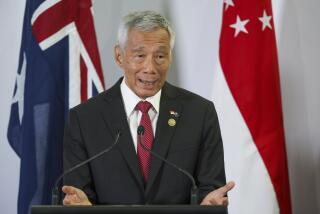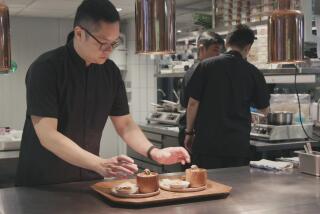Next Step : Shakeup in Singapore: An Autocrat Steps Aside : Prime Minister Lee Kuan Yew is turning power over to his deputy. Can his country’s economic miracle survive without him?
- Share via
SINGAPORE — It has been an epochal year for Singapore. In August, the tiny island nation celebrated 25 years of independence--a notable achievement given that few outside observers present at its birth believed the country would even survive, much less go on to become a model of the Asian economic miracle.
On Nov. 28, an even more momentous event will take place: Prime Minister Lee Kuan Yew, the man who made the miracle happen, transforming a backwater seaport into a high-tech financial and trade center, is stepping aside. Lee’s handpicked deputy, Goh Chok Tong, will take over as prime minister and Lee’s son, Lee Hsien Loong, will advance to the No. 2 job in the government.
Will Singapore change? Without Lee at the helm, can Singapore hope to maintain its remarkable record of growth and stability? And will a government used to an authoritarian style of leadership survive the transition to rule by consensus?
The answers may lie in Singapore’s unique situation and traditions.
Lee’s legacy is one of the success stories of Asia. Sandwiched into just 240 square miles, Singapore’s 2.6 million people now enjoy the highest per capita income in the region after Japan and oil-rich Brunei, with an economy that grew by 11% in 1988 and 9.2% last year.
The country is a bounty of civic amenities, ranging from tropical gardens to sparkling clean mass transit, a government where corruption is virtually non-existent and where the majority of residents live in publicly built homes that they were able to buy outright from the government.
But it is also a place so competitive that parents often feel compelled to hire tutors to coach their children through nursery school, and where the government tinkers with “genetic engineering” by trying to arrange marriages of well-educated civil servants. The pervasive presence of this “nanny” side of the government is frequently mentioned as one of the reasons that Singapore faces a problem with the emigration of its skilled workers.
The dilemma confronting the post-Lee leadership will be to create what Goh, borrowing from President Bush, calls a “gentler, kinder” government to keep the new generation content without diminishing Singapore’s renowned economic discipline.
Western diplomats stationed here are fond of remarking that Singapore functions more like a Fortune 500 corporation than a nation, which is both a tribute to the renowned efficiency of its management style and a barbed commentary on the intrusiveness of the government in the life of its people.
The analogy is a useful guide, however, when trying to understand the transition that is taking place. If Lee Kuan Yew at age 67 is stepping aside as Singapore’s chief executive officer, he is very much staying on as the chairman of the board.
Lee was quoted in 1988 as having told his political followers: “Those who believe that when I have left the government as prime minister, that I’ve gone into permanent retirement, should have their heads examined. Even from my sickbed, even if you are going to lower me into the grave, and I feel something is wrong, I’ll get up.”
After the transition, Lee is staying on in the government as a senior minister without portfolio, meaning that the considerable force of his personality will continue to be felt in Cabinet sessions. Most analysts believe that Lee had long ago turned over the day-to-day operations of the government to his deputies while reserving his time for setting the country’s broader agenda.
Perhaps equally important, Lee will continue as secretary general of the People’s Action Party, the political movement he founded with the Communists in the 1950s to fight for independence. Later, he wrested the party away from his erstwhile allies and used it to crush their opposition.
The party, which controls 80 of the 81 seats in Parliament, still functions more along the lines of a Communist movement than a Western political party, with an unknown number of key officials, secretly selected from the membership, exercising the real power. Thus, the man who controls the selection of these “cadres” will continue to command the loyalty of the government apparatus. That means the Anglophile Lee, who reportedly invites potential candidates to his home for an interview over afternoon tea.
There has even been speculation that Lee aspired to take on the post of Singapore’s president, which recently was beefed up from a ceremonial job to an elective post with veto powers over the judiciary and civil service. But Lee said last week that he has no intention of running for the job when the term of the current president, Wee Kim Wee, expires in October, 1993.
The transition is obviously focusing a lot of attention on the personality of Goh Chok Tong, the 49-year-old first deputy prime minister, who has finally begun to emerge from Lee’s shadow after 14 years in politics.
The former head of a state-run shipping line, Goh is an economist by training (including a masters degree at Massachusetts’ Williams College) who became a state minister for finance, minister for trade and industry, health minister and then defense minister before advancing to the deputy prime minister’s post. Like many senior Singaporeans, Goh projects a combination of earnestness and no-nonsense seriousness in his public appearances.
From his public statements, Goh has made clear that any changes will be more style than substance. For example, Goh has called for more local autonomy in making decisions about such things as schools and for a “lessening of the tight control, the strong central control of the past.”
Lest anyone get the wrong idea, however, Lee himself has remarked that his deputy “may speak softly, but he is no softie.” In fact, Goh took the lead role in Singapore’s recent conflict over news coverage of the country in both the Far Eastern Economic Review and the Asian Wall Street Journal--a conflict that has resulted in both publications virtually disappearing from the newsstands.
In an illuminating remark that many Western politicians might be leery of uttering as they assumed higher office, Goh told a public gathering in July: “If people behave in a manner that will threaten the wider interests of Singapore, they will feel the firm smack of the government. That must be so, because if you loosen the reins so much that people run all over Singapore, it can’t be good for Singapore. Every jockey in a race carries a whip to goad their horses to perform better.”
Not only will Goh have the elder Lee sitting in judgment on his performance as prime minister but there also is also the widely discussed presence of Lee’s son, Lee Hsien Loong, who after rising to the rank of brigadier general in the army at a young age became known universally in Singapore as B. G. Lee.
While there is a widely held conviction in Singapore that the choice of Goh as successor reflected the elder Lee’s determination to avoid a hint of nepotism, there is also a considerable feeling that the younger Lee will eventually inherit the prime minister’s job. So strong is such talk that Goh felt moved to publicly deny that he is a “seat warmer” for the younger Lee.
But last month, announcing the composition of his Cabinet, Goh promoted the younger Lee to deputy prime minister and said that even though the other deputy prime minister, Ong Teng Cheong, has greater seniority, B. G. Lee will head the government when Goh is away from Singapore.
A key test for Goh and his government will be the state of the economy in the next few years. With a recession looming in the Western world and oil prices skyrocketing, it is clear that Goh’s government will face a rocky transition period. The government has already embarked on a program to privatize key state-owned industries such as mass transit and telecommunications.
Goh will also have to deal with the government’s recent decline in popularity. In the last election, the ruling People’s Action Party received only 62% of the vote, though under the winner-take-all system it captured all but one seat in Parliament. Popular support has been steadily shrinking from a high of 84.4% in 1968.
Goh has said he will not dismantle the country’s Internal Security Act, which has been used to jail opposition leaders accused of subversion. But whether it will be employed is another matter.
In a recently published interview, Goh tried to contrast himself with the prime minister, who was a brilliant scholar at Britain’s Cambridge University but retains a reputation for intolerance of criticism.
“I have not reacted in the same way as the PM, who is quick to put down any opposing viewpoint,” Goh said. “In that sense, I’ll have more tolerance. I’ll listen to them. I prefer consensus-building instead of contention. If you oppose a certain point of view and are sincere--meaning if you’re prepared to argue your case based on fact and are not just out to whip up emotion--I’m prepared to listen. And, if you’re right, I’m prepared to reshape my policies accordingly.”
More to Read
Sign up for Essential California
The most important California stories and recommendations in your inbox every morning.
You may occasionally receive promotional content from the Los Angeles Times.










